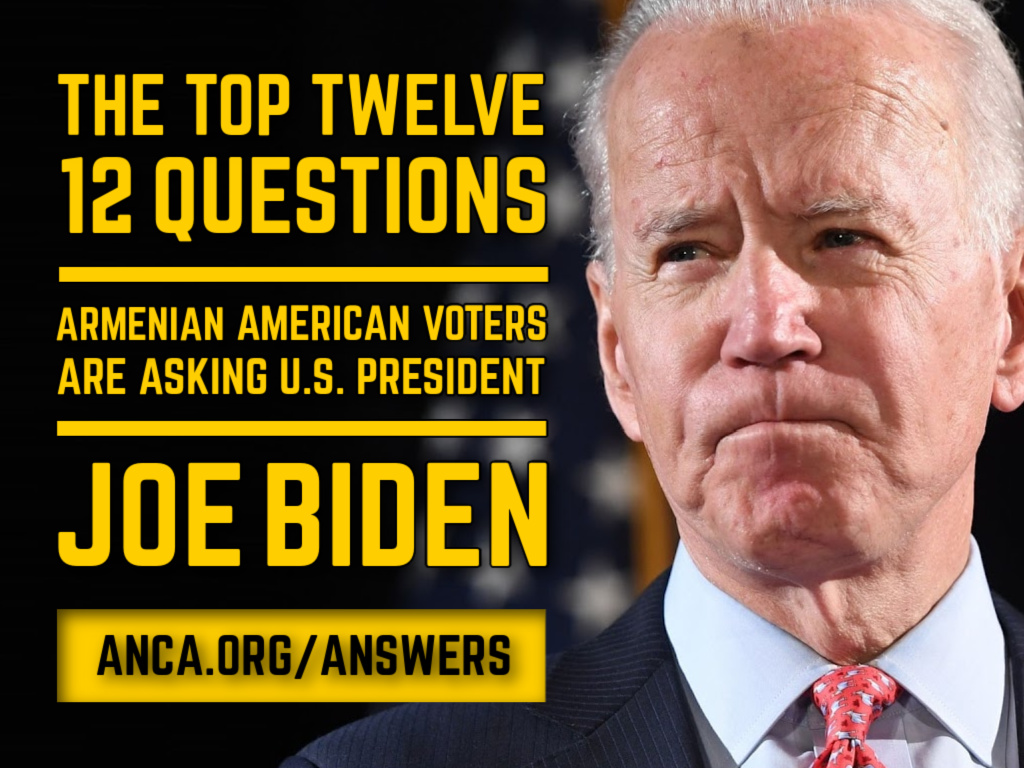WASHINGTON, DC – The Armenian National Committee of America (ANCA) is calling on Congress to press the Biden Administration to address dramatic shortfalls in U.S. policy to the South Caucasus which continue to undermine US interests, aid and abet ongoing Azerbaijani aggression, and undermine the security of Armenia and Artsakh.
In a letter to Congressional leaders, ANCA Chairman Raffi Hamparian called on Senators and Representatives to secure answers to twelve pressing questions covering a broad range of topics yet to be meaningfully addressed by the Biden Administration, including:
— Why has the Administration not called out Azerbaijan as the belligerent party, when its President Ilham Aliyev regularly and openly boasts about his offensive attack on Artsakh?
— As a candidate, President Biden called on the Trump Administration to fully enforce Section 907 – stating, on October 28, 2020, that “The [Trump] administration must fully implement and not waive requirements under section 907 of the Freedom Support Act to stop the flow of military equipment to Azerbaijan.” Where does the Administration stand regarding enforcement of Section 907 of the FREEDOM Support Act?
Read also
— USAID has reported that 90,000 Armenians were displaced during the Artsakh conflict, resulting in what it describes as an “acute humanitarian crisis.” Why has U.S. aid to Artsakh been so very low, and what exactly are the Administration’s plans to provide adequate humanitarian and developmental aid to Artsakh, including to Armenians ethnically-cleansed from their indigenous Artsakh homeland?
— Does the Administration consider Armenians held by Azerbaijan to be Prisoners of War, entitled to protections under the Third Geneva Convention and other international treaties? If so, has the U.S. government communicated our expectation to the Azerbaijani government that it must abide by its international commitments to immediately and unconditionally release all POWs?
— What has the Administration done to investigate and hold accountable U.S. manufacturers, the Turkish and Azerbaijani governments, and other stakeholders for potential violations of U.S. laws related to the discovery of U.S. parts in Turkish drones deployed by Azerbaijan.
— What has the Administration done to investigate and hold Turkey’s and Azerbaijan’s leaders accountable for recruiting foreign terrorist fighters and for deploying cluster bombs, white phosphorous, and other prohibited munitions against Artsakh?
— What has the Administration done to hold Azerbaijan’s leaders accountable for invading and occupying sovereign Armenian territory?
— What steps has the Administration taken to publicly confront Turkey’s ongoing denial and obstruction of justice for the Armenian Genocide, consistent with H.Res.296 (2019) and S.Res.150 (2019) calling upon the United States to “reject efforts to enlist, engage, or otherwise associate the United States Government with denial of the Armenian Genocide or any other genocide.”
— What steps has the Administration taken to “encourage education and public understanding of the facts of the Armenian Genocide, including the United States role in the humanitarian relief effort, and the relevance of the Armenian Genocide to modern-day crimes against humanity,” consistent with H.Res.296 (2019) and S.Res.150 (2019)?
— What actions is the Administration taking to ensure that justice is served in U.S. courts and via other avenues regarding members of Turkish President Recep Erdogan’s security detail, who were charged with committing felony assaults against peaceful U.S. protesters on May 16, 2017, in Washington, DC’s Sheridan Circle?
— A December 17, 2021 letter from the Federal Aviation Administration’s Office of Commercial Space Transportation to the ANCA and other coalition partners noted that the Department of State and other U.S. agencies “had no issues” with the planned SpaceX launch of the Turksat-5B satellite. Did the Administration, as part of this review, consider the implications of this launch upon the range and lethality of Turkey’s drone fleet?
— Has the Administration offered to make satellite imaging and other resources available to researchers and scholars documenting, monitoring, protecting, preserving, and raising awareness about threats to Armenian churches and other holy and cultural sites in areas of Artsakh that are currently under Azerbaijani military control?






















































